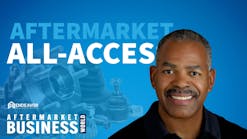U.S. Commercial Service aiding success at Automechanika Istanbul
American exhibitors and attendees seeking a presence at Turkey’s April 7-10 Automechanika Istanbul exposition are being offered assistance from the U.S. Commercial Service, which is eager to ease access to the nation’s rapidly expanding aftermarket opportunities.
“We have a huge portfolio of visiting buyers,” reports show director Can Berki, who took part in a recent webinar facilitated by the Commercial Service’s automotive division.
“You’re not just doing business with Turkey,” he says, “but also the surrounding countries” throughout the Eurasian region.
The 2015 Automechanika Istanbul attracted 13 U.S. firms as exhibitors, with the show generating 295 promising trade leads for them. More than 46,000 visitors passed through the turnstiles, including buying delegations from the U.S., Bosnia Herzegovina, Bulgaria, Israel, Kyrgyzstan, Moldova, Pakistan and Tunisia.
“Once again, Automechanika Istanbul has proven itself to be an international platform for the presentation of important (products and services) throughout the entire automotive sector and has underlined its leading position in the Turkish automotive industry,” says Messe Frankfurt Istanbul managing director Tayfun Yardım. “We are proud to have organized such a professional and international fair, and the high satisfaction of participants proves that the investments made in the concept and promotion of the fair were the right ones.”
Nineteen international pavilions are set to be erected at this year’s event; nearly 15 U.S. suppliers are already slated to display their wares, and an onsite Automechanika Academy will feature a series of seminars aimed at providing practical advice for entering the marketplace.
Sourcing parts produced in Turkey, a $13-billion industry, is another aspect of Automechanika Istanbul. The nation manufactures engines and engine parts, powertrains, brake systems, hydraulics and pneumatic parts, suspension systems, plastic and rubber parts, chassis and body parts, forged and cast parts, batteries, seats and heating, cooling and ventilation systems.
A trusted partner
The Commercial Service suggests that “careful planning and patience are the keys to success in Turkey” as the agency takes an interest in supporting Automechanika Istanbul as part of its efforts to promote overseas trade shows “as good venues for U.S. companies to meet with potential customers, thereby increasing the potential for U.S. exports,” says Lesa Forbes, senior international trade specialist and global automotive team leader at the U.S. Department of Commerce.
“It’s important to have a trusted partner on the ground to assist you,” according to Forbes, citing the array of Commercial Service programs for connecting sellers and buyers.
“U.S. exhibitors benefit from the network of offices worldwide,” says Berrin Erturk, who is based at the American Embassy in Izmir. “Even if you can’t make it (to Automechanika Istanbul), we are standing by to make you successful in the Turkish market.”
Erturk points out that Turkey “is a strategically important location” given its designation as “the crossroads of Europe and Asia” and the nation’s advancing automotive presence.
“There is a willingness to spend money on vehicles in the market,” she says, referring to incentives for OEMs and parts manufacturers enacted in 2013 that have spurred a heightened amount of motorists and a resulting increase in demand for maintenance and other related services.
“The Turkish market is still unsaturated” for aftermarket businesses, and “2015 was a record year for vehicle production” that bodes well for future sales prospects, Erturk says.
Automotive production in 2015 amounted to 791,000 passenger cars and 568,000 commercial vehicles. The market share leaders were Renault at 15 percent and Volkswagen at 14 percent.
Other OEMs in Turkey include Ford, Fiat, Chrysler, Honda, Hyundai, Peugeot, Man, Mercedes, Isuzu, Mitsubishi, Toyota, Otokar, Karsan, BMC, Temsa, Askan, Iveco and Turk Traktor.
As Turkey seeks official entry into the European Union with a focus on complying with stringent EU regulatory standards, “the parts and performance market is limited to European-type products” for the most part, she notes, yet “there is strong interest in the American SUV” as various automakers ramp up imports of these models into the nation.
Integration into the EU is expected to bring higher sales of advanced auto parts along with an increased amount of parts suppliers and more demand for service equipment.
Currently there are 250 foreign manufacturers pursuing the Turkish parts industry either through direct investments or joint venture partnerships, including 35 of the top 100 global automotive suppliers such as Delphi, Cummins, Gates and Bosch. Component “imports have almost doubled in the past five to six years,” says Erturk. “The demand for automatic transmissions has shown a high growth in the last decade.”
Manual transmissions account for 60 percent of the existing car parc, with automatics claiming the remaining 40 percent. Slightly more than 60 percent of the vehicles are diesels, compared to a 38 percent ranking for gasoline engines.
Major import component categories include diesel engines, engine parts, body panels, accessories, gear boxes, tires, brakes and axles.
Tight government regulations restrict the importation of certain used cars, plus any parts that are used, reconditioned, rebuilt or remanufactured.
U.S. negotiators are attempting to eliminate these policies because they create problems for importers and force Turkish drivers to pay higher prices for their parts. “We raise it every time we meet with the Turkish government, which is quite frequently,” says Joshua Burke, a Commercial Service officer based in Ankara.
Tax rates and other cost-related issues per imported parts are a key factor to be considered, according to Burke. “Your products will now be seen as more expensive than other products, so you should keep that in mind with your pricing.”
A dynamic population
“Turkey has incredible opportunity” for businesses contemplating entry into the automotive market, Burke urges, especially given the government’s aggressive efforts to triple its gross domestic product output.
Streets in the major cities are bustling with new drivers and those who are keen on getting behind the wheel. “You have a very young and dynamic population. It is definitely an economy that is big on thinking big.”
The nation is home to an ambitious and educated pool of potential employees who are “very diligent in their work,” he says, noting that more than 1,200 American firms have Turkish operations in place.
Burke makes a comparison to the Mexican automotive realm, saying, “if you’re doing business in Mexico, Turkey is definitely a market to take a look at as well.”
Aftermarket enterprises are best advised to form partnerships with Turkish distributors and entrepreneurs who know the business landscape and can guide you through the cultural norms. “It requires presence – it requires tea,” says Burke, reflecting on the amount of dinners and tea-drinking sessions that are accepted as necessary to establish positive relationships.
“It’s quite a dynamic time” in Turkey, he emphasizes, “and our team at the Commercial Service is always here to help you.”
Subscribe to Aftermarket Business World and receive articles like this every month….absolutely free. Click here.


